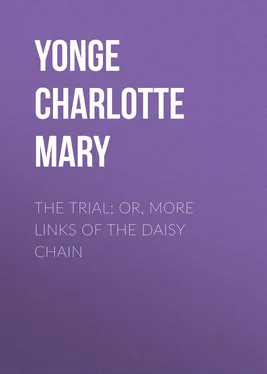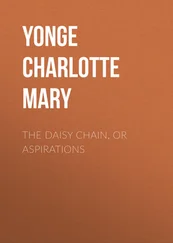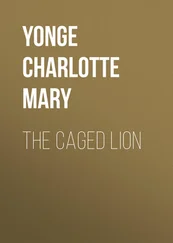Charlotte Yonge - The Trial; Or, More Links of the Daisy Chain
Здесь есть возможность читать онлайн «Charlotte Yonge - The Trial; Or, More Links of the Daisy Chain» — ознакомительный отрывок электронной книги совершенно бесплатно, а после прочтения отрывка купить полную версию. В некоторых случаях можно слушать аудио, скачать через торрент в формате fb2 и присутствует краткое содержание. Жанр: foreign_prose, literature_19, Европейская старинная литература, foreign_antique, на английском языке. Описание произведения, (предисловие) а так же отзывы посетителей доступны на портале библиотеки ЛибКат.
- Название:The Trial; Or, More Links of the Daisy Chain
- Автор:
- Жанр:
- Год:неизвестен
- ISBN:нет данных
- Рейтинг книги:4 / 5. Голосов: 1
-
Избранное:Добавить в избранное
- Отзывы:
-
Ваша оценка:
- 80
- 1
- 2
- 3
- 4
- 5
The Trial; Or, More Links of the Daisy Chain: краткое содержание, описание и аннотация
Предлагаем к чтению аннотацию, описание, краткое содержание или предисловие (зависит от того, что написал сам автор книги «The Trial; Or, More Links of the Daisy Chain»). Если вы не нашли необходимую информацию о книге — напишите в комментариях, мы постараемся отыскать её.
The Trial; Or, More Links of the Daisy Chain — читать онлайн ознакомительный отрывок
Ниже представлен текст книги, разбитый по страницам. Система сохранения места последней прочитанной страницы, позволяет с удобством читать онлайн бесплатно книгу «The Trial; Or, More Links of the Daisy Chain», без необходимости каждый раз заново искать на чём Вы остановились. Поставьте закладку, и сможете в любой момент перейти на страницу, на которой закончили чтение.
Интервал:
Закладка:
'Oh, it was not her doing,' said Aubrey, 'it was I! I thought Tom would find me gone back; and, you know, we must keep up together, Leonard, and be entered at St. John's at the same time.'
For Aubrey devoutly believed in Tom's college at Cambridge, which had recovered all Dr. May's allegiance.
The extra brightness was not of long duration. It was a very hot day, such as exactly suited the salamander nature of Dr. Spencer; but the carriage became like an oven. Aubrey curled himself up in a corner and went to sleep, but Leonard's look of oppressed resignation grieved Ethel, and the blue blinds made him look so livid, that she was always fancying him fainting, and then his shyness was dreadful—it was impossible to elicit from him anything but 'No, thank you.'
He did nearly faint when they left the train; and while Aubrey was eagerly devouring the produce of the refreshment room, had to lie on a bench under Dr. Spencer's charge, for Ethel's approach only brought on a dangerous spasm of politeness. How she should get on with him for a month, passed her imagination.
There was a fresher breeze when they drove out of the station, up a Dorset ridge of hill, steep, high, terraced and bleak; but it was slow climbing up, and every one was baked and wearied before the summit was gained, and the descent commenced. Even then, Ethel, sitting backwards, could only see height develop above height, all green, and scattered with sheep, or here and there an unfenced turnip-field, the road stretching behind like a long white ribbon, and now and then descending between steep chalk cuttings in slopes, down which the carriage slowly scrooped on its drag, leaving a broad blue-flecked trail. Dr. Spencer was asleep, hat off, and the wind lifting his snowy locks, and she wished the others were; but Aubrey lamented on the heat and the length, and Leonard leant back in his corner, past lamentation.
Down, down! The cuttings were becoming precipitous cliffs, the drag made dismal groans; Aubrey, after a great slip forward, looking injured, anchored himself, with his feet against the seat, by Ethel; and Dr. Spencer was effectually wakened by an involuntary forward plunge of his opposite neighbour. 'Can this be safe?' quoth Ethel; 'should not some of us get out?'
'Much you know of hills, you level landers!' was the answer; and just then they were met and passed by four horses dragging up a stage coach, after the fashion of a fly on a window-pane—a stage coach! delightful to the old-world eyes of Dr. Spencer, recalling a faint memory to Ethel, and presenting a perfect novelty to Aubrey.
Then came a sudden turn upon flat ground, and a short cry of wonder broke from Aubrey. Ethel was sensible of a strange salt weedy smell, new to her nostrils, but only saw the white-plastered, gray-roofed houses through which they were driving; but, with another turn, the buildings were only on one side—on the other there was a wondrous sense of openness, vastness, freshness—something level, gray, but dazzling; and before she could look again, the horses stopped, and close to her, under the beetling, weather-stained white cliff, was a low fence, and within it a verandah and a door, where stood Flora's maid, Barbara, in all her respectability.
Much wit had been expended by Aubrey on being left to the tender mercy of cruel Barbara Allen, in whom Ethel herself anticipated a tyrant; but at the moment she was invaluable. Every room was ready and inviting, and nothing but the low staircase between Leonard and the white bed, which was the only place fit for him; while for the rest, the table was speedily covered with tea and chickens; Abbotstoke eggs, inscribed with yesterday's date; and red mail-clad prawns, to prove to touch and taste that this was truly sea-side. The other senses knew it well: the open window let in the indescribable salt, fresh odour, and the entire view from it was shore and sea, there seemed nothing to hinder the tide from coming up the ridge of shingle, and rushing straight into the cottage; and the ear was constantly struck by the regular roll and dash of the waves. Aubrey, though with the appetite of recovery and sea-air combined, could not help pausing to listen, and, when his meal was over, leant back in his chair, listened again, and gave a sigh of content. 'It is one constant hush, hushaby,' he said; 'it would make one sleep pleasantly.'
His companions combined their advice to him so to use it; and in less than half an hour Ethel went to bid him good night, in the whitest of beds and cleanest of tiny chambers, where he looked the picture of sleepy satisfaction, when she opened his window, and admitted the swell and dash that fascinated his weary senses.
'My child is all right,' said Ethel, returning to Dr. Spencer; 'can you say the same of yours?'
'He must rest himself into the power of sleeping. I must say it was a bold experiment; but it will do very well, when he has got over the journey. He was doing no good at home.'
'I hope he will here.'
'Depend on it he will. And now what are you intending?'
'I am thirsting to see those waves near. Would it be against the manners and customs of sea-places for me to run down to them so late?'
'Sea-places have no manners and customs.'
Ethel tossed on her hat with a feeling of delight and freedom. 'Oh, are you coming, Dr. Spencer? I did not mean to drag you out. You had rather rest, and smoke.'
'This is rest,' he answered.
The next moment, the ridge of the shingle was passed, and Ethel's feet were sinking in the depth of pebbles, her cheeks freshened by the breeze, her lips salted by the spray tossed in by the wind from the wave crests. At the edge of the water she stood—as all others stand there—watching the heaving from far away come nearer, nearer, curl over in its pride of green glassy beauty, fall into foam, and draw back, making the pebbles crash their accompanying 'frsch.' The repetition, the peaceful majesty, the blue expanse, the straight horizon, so impressed her spirit as to rivet her eyes and chain her lips; and she receded step by step before the tide, unheeding anything else, not even perceiving her companion's eyes fixed on her, half curiously, half sadly.
'Well, Ethel,' at last he said.
'I never guessed it!' she said, with a gasp. 'No wonder Harry cannot bear to be away from it. Must we leave it?' as he moved back.
'Only to smooth ground,' said Dr. Spencer; 'it is too dark to stay here among the stones and crab-pots.'
The summer twilight was closing in; lights shining in the village under the cliffs, and looking mysterious on distant points of the coast; stars were shining forth in the pale blue sky, and the young moon shedding a silver rippled beam on the water.
'If papa were but here!' said Ethel, wakening from another gaze, and recollecting that she was not making herself agreeable.
'So you like the expedition?'
'The fit answer to that would be, "It is very pretty," as the Cockney said to Coleridge at Lodore.'
'So I have converted a Stoneborough fungus!'
'What! to say the sea is glorious? A grand conversion!'
'To find anything superior to Minster Street.'
'Ah, you are but half reclaimed! You are a living instance that there is no content unless one has begun life as a fungus.'
She was startled by his change of tone. 'True, Ethel. Content might have been won, if there had been resolution to begin without it.'
'I beg your pardon,' she faltered, 'I ought not to have said it. I forgot there was such a cause.'
'Cause—you know nothing about it.'
She was silent, distressed, dismayed, fearing that she had spoken wrongly, and had either mistaken or been misunderstood.
'Tell me, Ethel,' he presently said, 'what can you know of what made me a wanderer?'
'Only what papa told me.'
'He—he was the last person to know.'
Читать дальшеИнтервал:
Закладка:
Похожие книги на «The Trial; Or, More Links of the Daisy Chain»
Представляем Вашему вниманию похожие книги на «The Trial; Or, More Links of the Daisy Chain» списком для выбора. Мы отобрали схожую по названию и смыслу литературу в надежде предоставить читателям больше вариантов отыскать новые, интересные, ещё непрочитанные произведения.
Обсуждение, отзывы о книге «The Trial; Or, More Links of the Daisy Chain» и просто собственные мнения читателей. Оставьте ваши комментарии, напишите, что Вы думаете о произведении, его смысле или главных героях. Укажите что конкретно понравилось, а что нет, и почему Вы так считаете.












